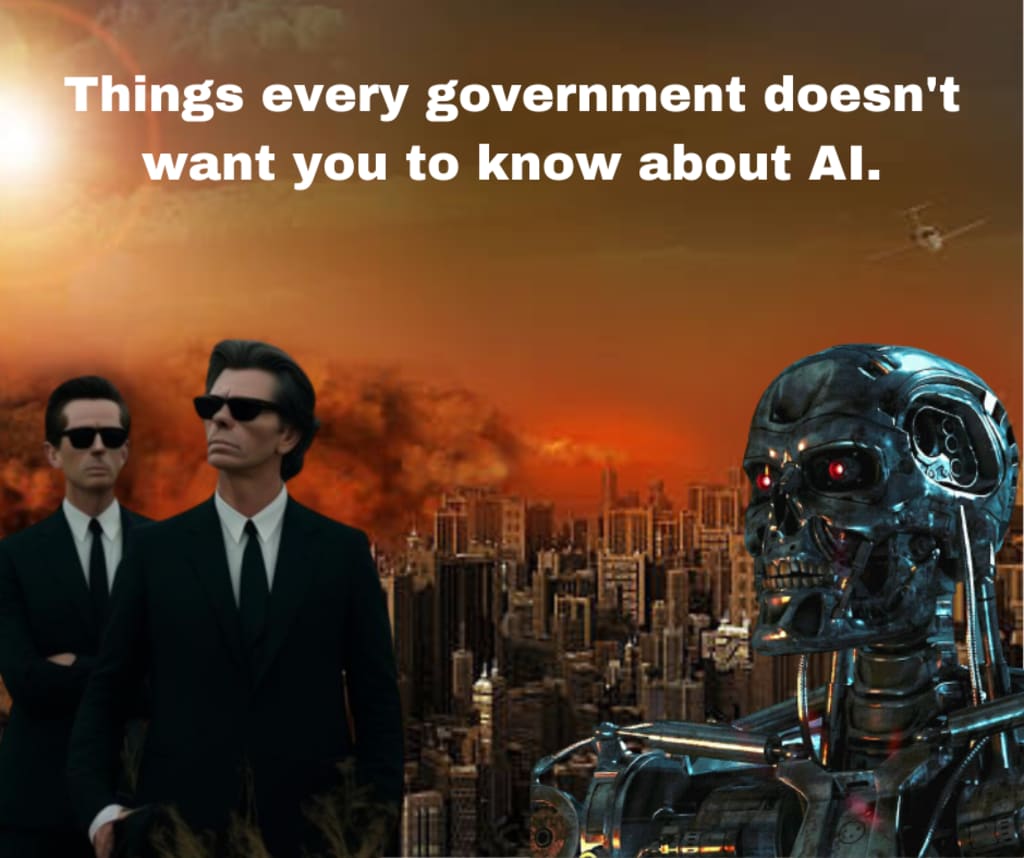Things the government don’t want you to know about AI.
Write in the comments if you know any of this facts

The idea that “every government” doesn’t want people to know certain things about AI is a generalization, and the degree of secrecy or suppression can vary greatly from one government to another. However, there are some important considerations and potential concerns regarding AI that may not be widely discussed or highlighted by governments. Here are a few aspects that some individuals may believe governments might not be fully transparent about:
Surveillance and Privacy Concerns:
Governments often use AI for surveillance purposes, which raises concerns about privacy infringement. Facial recognition technology, for instance, can be used to track individuals' movements without their knowledge or consent, leading to debates about the balance between security and civil liberties.
Biased Decision-Making:
AI algorithms can inadvertently perpetuate biases present in training data. Governments may not openly acknowledge the extent to which these biases impact decision-making processes, potentially leading to unjust outcomes in areas like law enforcement, hiring, and lending.
Data Collection and Ownership:
Governments collect vast amounts of data on citizens for various purposes. However, the extent of data collection, the types of data being gathered, and how it's used might not be fully transparent. Citizens may not be aware of the ownership and control governments assert over this data.
Algorithmic Influence on Policies:
AI algorithms can influence policy decisions, such as resource allocation or healthcare policies. Governments might not openly disclose the degree to which AI systems shape these decisions, which raises questions about accountability and human oversight.
Autonomous Weapons and Military AI:
The development of AI-powered autonomous weapons has raised concerns about the potential for lethal AI systems that can make life-and-death decisions without human intervention. Governments might not readily share the advancements in this area due to ethical and security implications.
Social Manipulation and Disinformation:
AI can be used to manipulate public opinion through targeted social media campaigns and deepfake technology. Governments might not want to reveal the extent to which they utilize or counteract such tactics for political or strategic reasons.
Job Disruption and Economic Impact:
Automation driven by AI has the potential to disrupt job markets and lead to significant economic changes. Governments might not openly discuss the magnitude of these disruptions or their strategies to address them, leaving citizens uncertain about the future of work.
Autonomous Vehicles and Road Safety:
While governments are promoting the development of autonomous vehicles, they might not openly address the challenges and ethical dilemmas these vehicles face, such as how AI should make life-or-death decisions in unavoidable accidents.
Impact on Mental Health:
AI algorithms drive content recommendations on social media platforms, potentially leading to echo chambers and negative mental health effects. Governments may not openly disclose how much they understand or address these concerns.
Lack of Regulation and Oversight:
Governments may not be upfront about the challenges they face in regulating AI technologies effectively. The rapidly evolving nature of AI makes it difficult to create laws that keep up with the pace of innovation.
Trade Secrets and National Security:
Governments may withhold certain AI developments due to their strategic importance for national security. This lack of transparency can hinder global cooperation and understanding.
AI in Criminal Justice:
The use of AI in criminal justice, such as predictive policing or sentencing algorithms, may not be fully disclosed to the public. This can raise concerns about transparency, fairness, and accountability.
Digital Surveillance and Cybersecurity:
While governments emphasize cybersecurity efforts, they might not openly disclose the extent of their digital surveillance capabilities, leaving citizens unaware of potential vulnerabilities in their digital lives.
AI in Healthcare:
Governments may not disclose the comprehensive use of AI in healthcare systems, including personalized medicine and medical diagnoses, raising concerns about data security and patient consent.
Climate Change and AI Impact:
The role of AI in addressing climate change might not be fully communicated. Governments could use AI to model and mitigate environmental challenges, but their exact strategies might not be widely shared.
In conclusion, while governments around the world are actively engaging with AI for various purposes, there are aspects they may not openly disclose due to concerns about security, ethics, and societal impact. Understanding these potential gaps in information is crucial for citizens to participate in informed discussions about the responsible use of AI and its implications for society.
About the Creator
Enjoyed the story? Support the Creator.
Subscribe for free to receive all their stories in your feed. You could also pledge your support or give them a one-off tip, letting them know you appreciate their work.





Comments (1)
Fantastic. .